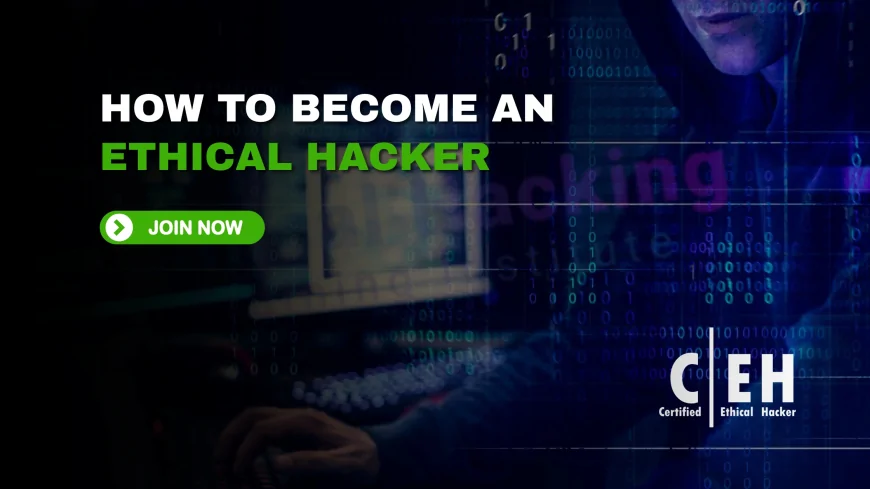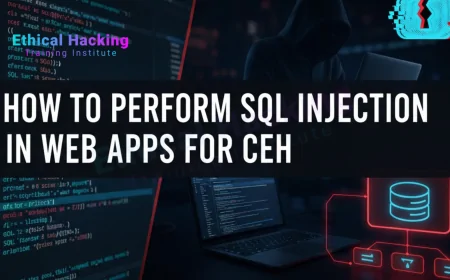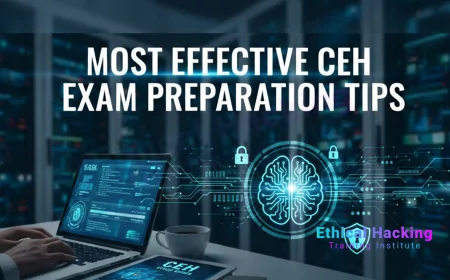Learn Ethical Hacking: The Best Courses and Resources to Get Started | Learn Ethical Hacking: Best Courses & Resources for Beginners
Start your ethical hacking journey with the best courses, free resources, books, tools, labs, and certifications. Learn hacking from scratch today.

Table of Contents
- Introduction
- Why Learn Ethical Hacking?
- Prerequisites & Foundation
- Top Online Courses
- Free and Open Resources
- Recommended Books
- Hands‑On Labs & Platforms
- Certifications to Pursue
- 12‑Week Study Plan
- Essential Tools to Learn
- Community & Mentorship
- Career Path & Roles
- Important Soft Skills
- Common Challenges & Solutions
- FAQs
- Conclusion
Introduction
Ethical hacking is about finding and fixing system vulnerabilities before attackers exploit them. Whether you're starting from zero or shifting careers into cybersecurity, the right courses and resources can fast-track your progress. This guide covers the best paid and free materials, platforms, tools, strategies, and career insights to help you get started and excel.
Why Learn Ethical Hacking?
- High Demand: Security professionals are in critical shortage globally.
- Protect Systems: Ethical hackers play a crucial role in preventing real breaches.
- Lucrative Roles: Entry-level income often exceeds ₹6–8 LPA in India and $60K globally.
- Versatile Skills: Hacking overlaps networking, programming, forensics, and more.
Prerequisites & Foundation
Start with:
- Networking essentials (TCP/IP, DNS, HTTP, OSI model)
- Operating systems—Linux (Kali) and Windows
- Basic scripting (Python, Bash, PowerShell)
- Understanding of virtualization (VirtualBox, VMware)
Top Online Courses
Certified Ethical Hacker (CEH) v13
-
🇮🇳 Format: Instructor-led live online + recorded sessions
-
Curriculum: Full EC-Council CEH syllabus—including footprinting, network scanning, system & web app hacking, malware analysis, cloud & IoT security, cryptography, and pentesting methodology
-
Flexibility: Scheduling with weekday and weekend batches, plus recorded sessions for those who miss a class.
Ethical Hacking (Beyond CEH)
-
Topics: Covers CEH, Advanced Penetration Testing, SOC Analyst, CPENT
-
Delivery: Live online and classroom modes
-
Accreditation: EC-Council Accredited Training Center
CND & CHFI (Complementary Security Courses)
-
Certified Network Defender (CND): Network defense and monitoring
-
Computer Hacking Forensic Investigator (CHFI): Digital forensics and investigative skills
-
Format: Live instructor-led, with labs and certification support
CISSP via Coursetakers Platform
-
Purpose: Designed for aspiring security managers
-
Format: Online instructor-led (2 months)
What Sets WebAsha’s Online Courses Apart
-
Expert Trainers: Instructors with real-world cybersecurity experience at ATOS, Vodafone, IBM, etc.
-
High Placement Success: Over 1,500 jobs placed in the last year with 90% conversion rate
-
Hands-on Virtual Labs: Available full-time; powerful simulated environments for real-time practice
-
Flexible & Affordable: Multiple batches, negotiable fees, and session make-ups
-
Global Accreditation: EC-Council authorized; uses official curriculum and exam vouchers
Comparison Table
| Course / Certification | Format | Labs | Accreditation | Career Focus |
|---|---|---|---|---|
| CEH v13 | Live online / recorded | Yes | EC-Council | Pen-testing, Ethical Hacking |
| Ethical Hacking Suite | Live online / classroom | Yes | EC-Council | CEH, CPENT, SOC, CPENT |
| CND | Live online | Yes | EC-Council | Network Defense |
| CHFI | Live online | Yes | EC-Council | Digital Forensics |
| CISSP Prep | Online via Coursetakers | No? | ISC² | Security Management |
Free and Open Resources
- OWASP** — guides on web app vulnerabilities
- OverTheWire** wargame series — practical terminal challenges
- VulnHub** — downloadable vulnerable VMs
- CyberSec Lab** on GitHub — scripts and CTF guides
- YouTube channels like NetSecFocus, The Cyber Mentor, and HackerSploit
Recommended Books
- “The Web Application Hacker’s Handbook” by Dafydd Stuttard & Marcus Pinto
- “Metasploit: The Penetration Tester’s Guide”
- “Practical Malware Analysis" by Michael Sikorski and Andrew Honig is a must-read for aspiring malware analysts.
- “Black Hat Python” by Justin Seitz
- “Hacking: The Art of Exploitation” by Jon Erickson
Hands‑On Labs & Platforms
- TryHackMe, Hack The Box: Guided and unstructured penetration paths
- VirtualBox/VMware: Host Kali Linux and vulnerable VMs
- Burp Suite Community: Use Burp Suite Community to analyze web traffic and test vulnerabilities on training sites.
- Google Gruyere, DVWA: Install and test web vulnerabilities
Certifications to Pursue
- CompTIA Security+/Network+: Foundations in security and networking
- eJPT: Entry-level, performance-based certification
- Certified Ethical Hacker (CEH): Tool-oriented, recognized internationally
- OSCP: Practical, hardest industry-standard penetration testing certification
12‑Week Study Plan
- Weeks 1–2: Networking + Linux basics + scripting intro
- Weeks 3–4: Reconnaissance + scanning (Nmap, Wireshark)
- Weeks 5–6: Exploitation frameworks (Metasploit, manual)
- Weeks 7–8: Web app hacking (Burp, OWASP juice shop)
- Weeks 9–10: Wireless, Windows security, AD, PowerShell
- Weeks 11–12: Practice CTFs, mock cert tests, portfolio/demo builds
Essential Tools to Learn
- Nmap, Netcat, Wireshark
- Metasploit Framework, Armitage
- Burp Suite / OWASP ZAP / SQLMap
- Aircrack-ng, tools for Wi‑Fi
- John the Ripper, Hashcat
- Ghidra, Radare2
Community & Mentorship
- Join Discord/Slack groups (TryHackMe, Hack The Box channels)
- Participate in CTF events, hackathons (CTFtime)
- Attend local meetups, Defcon groups
- Find mentors in cybersecurity forums, LinkedIn or Reddit (r/netsec)
Career Path & Roles
- Tier 1: SOC Analyst / Junior Pen Tester
- Tier 2: Ethical Hacker, Web App Penetration Tester
- Tier 3: Red Team Specialist, Security Consultant
- Tier 4: Team Lead, Security Architect, Bug Bounty Expert
Important Soft Skills
- Effective communication and reporting
- Ethical integrity and handling sensitive data
- Continuous learning mindset
- Time management and organisation
Common Challenges & Solutions
- Overwhelm: Focus on one skill/module at a time
- Lab issues: Use updated VMs and community support
- Motivation drop: Join study groups and set small achievements
- Skill stagnation: Continuously learn and take on new CTF challenges
FAQs
1. Is hacking dangerous for beginners?
No—using legal platforms keeps your learning safe and responsible.
2. Can I learn without a degree?
Yes—self-study, labs, and certifications can match or exceed formal education.
3. Is CEH or OSCP better?
CEH is tool-based and recognized broadly; OSCP is more technical and task-oriented.
4. How much time per week?
8–10 hours weekly for 12-week plan suits most learners.
5. Are free labs enough?
They are great to start—complement them with paid platforms for depth.
6. Can I work while learning?
Yes—structured study plans help balance work and learning.
7. What's the cost range?
From free (YouTube, OWASP) to ₹50K–150K for certified paid programs.
8. What’s the first tool to learn?
Nmap—for network discovery and scanning fundamentals.
9. Do I need mentors?
Mentorship accelerates progress, accountability, and networking.
10. How to practice daily?
Use TryHackMe daily challenges or 30-minute CTF tasks.
11. Is scripting mandatory?
Yes—for automating tasks and custom exploit writing.
12. How do I track progress?
Keep lab logs, CTF rankings, and periodic mock tests.
13. Which book to read first?
Start with “The Web Application Hacker’s Handbook.”
14. Are YouTube courses reliable?
Generally useful—pair them with hands-on practice and structured learning.
15. Can I freelance?
Yes—after certification and lab competence, bug bounties and freelance testing are viable.
16. Is ethical hacking legal?
Yes—with proper authorization; never test systems without permission.
17. Can I switch careers?
Many professionals start with IT and transition into ethical hacking through self-learning and labs.
18. What's the community like?
Very supportive—many share labs, tutorials, and challenges openly.
19. How often should I refresh skills?
Cybersecurity evolves fast—continue learning monthly and update toolkits yearly.
20. What makes a great ethical hacker?
A relentless learner with ethical boundaries, technical skills, creativity, and strong problem-solving.
Conclusion
Learning ethical hacking requires dedication, practical experience, and high-quality resources. This guide has gathered the best courses, books, labs, certifications, and communities—so you can follow a structured path to build strong offensive and defensive cybersecurity skills. Stay curious, stay ethical, and continue evolving.
What's Your Reaction?
 Like
1
Like
1
 Dislike
0
Dislike
0
 Love
0
Love
0
 Funny
0
Funny
0
 Angry
0
Angry
0
 Sad
0
Sad
0
 Wow
0
Wow
0

















